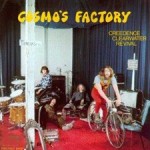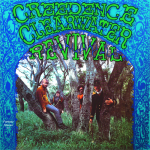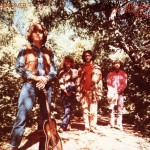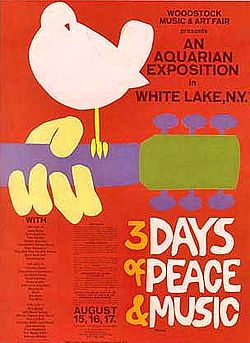Doug “Cosmo” Clifford was the drummer for Creedence Clearwater Revival, whose songbook includes classics such as “Proud Mary”, “Bad Moon Rising”, “Green River”, “Down on the Corner”, “My Back Door”, “Fortunate Son”, “Have You Ever Seen the Rain?”, “Travelin’ Band”, and “Up Around the Bend”. Creedence also did smokin’ covers of “Susie Q” and “I Heard It Through the Gravevine”. The band broke up acrimoniously in 1972, and was inducted into the Rock and Roll Hall of Fame in 1993.
In 1995, Clifford and Creedence Clearwater Revival bassist Stu Cook formed Creedence Clearwater Revisited, the name change reflecting the absence of singer/songwriter John Fogerty and his late brother Tom. This band, which not coincidentally also abbreviates to CCR, plays the hits we know and love from their days with Creedence Clearwater Revival.
This interview was done by phone on 7/3/13 for a preview article for Creedence Clearwater Revisited’s concert at the Santa Barbara County Fair in Santa Maria on 7/13/13.
For more on Creedence, here is an interview with Stu Cook.
Jeff Moehlis: What can we look forward to at the upcoming show?
Doug Clifford: A lot of good rock and roll, that’s for sure. If you like Creedence you’re gonna love this band.
JM: I saw you guys when you played at the Chumash Casino last summer, and thought you sounded wonderful. Is it the same line-up as for that show?
DC: Yeah, it’s the same line-up. [In addition to Clifford and Cook, the band consists of vocalist and rhythm guitarist Johnny “The Bulldog” Tristao, guitarist Kurt Griffey, and multi-instrumentalist Captain Steve Gunner.]

JM: Where did your nickname “Cosmo” come from?
DC: [laughs] College days, actually. Stu and I went to San Jose State, and I don’t know the origin of this part of it but they called me “Clifford C. Clifford”.
So I was an amateur entomologist as a kid, and we lived in the Animal House at the time, an old Victorian that had no adult supervision, and I’m sure John Belushi was in there somewhere. Also, because there was no supervision there were empty wrappers and hamburger crap and old food on the floor and in the rooms. It was just a pigsty, so we had roaches and ants and spiders, just to name a few. I couldn’t stand it anymore, and I got everybody together and I said, “Look, if you cooperate I’ll guarantee to get rid of the vermin, but you’re going to have to help me out.”
So everybody cleaned up, and knowing what poisons would kill what particular species of bug that we were after, I did it. The ant problem had gone on for like a decade; when the house was cleaned before they brought in pest control people, and nothing happened. So I completed my mission.
So we were at a toga party drinking cheap red wine and someone yelled out, “Hey, Clifford C. Clifford. What does the ‘C’ stand for?” This was in about ’65. The first hippie in the house said, “It stands for ‘Cosmo'”, because he’s cosmic. He’s a man of nature.” And it stuck like poop on a shoe ever since.

JM: Creedence Clearwater Revival had a different sound from the other bands from the Bay Area at the time. From your perspective, where did CCR fit in with that scene?
DC: Well, we didn’t [laughs]. Our peers laughed at us and called us the “Boy Scouts of Rock and Roll” because we played sober, we practiced sober, and we were playing the style of music that we were playing. I mean, they just said we wouldn’t make it playing that stuff, and we said, “Well, then we’ll never make it. But we’re not gonna be something that isn’t us.” The last laugh is always the best.
JM: It’s amazing how productive the band was. For example, in 1969 you released three phenomenal albums [Bayou Country, Green River, Willy and the Poor Boys]. How did you guys do it? How did you keep up that sort of pace?
DC: It was kind of silly really, but that’s how we did things. We worked every day, and as I said, even in rehearsals or practice or whatever you want to call it, everybody was straight and sober. That was the deal we made. A strong work ethic, basically. Things were easier to do because you were cognizant of what you were doing. Material would come in, or ideas, we’d work them up and figure out the drum part – I’d come up with that most of the time. We just didn’t waste any time.

We rehearsed, went into the studio, and we knocked out an album in two weeks. That’s from first going in for tracking to coming out with a finished product. We were well-prepared, I guess that’s the term.
JM: That kind of gets to my next question: what was the recording process like? It sounds like you went in very prepared and cranked it out quickly?
DC: Yeah, we had more one-takes that any band I know of to this day. We did all the rehearsing and all the work so that when we were in the studio every minute was productivity. That’s how we did it. Just being prepared, prepared, prepared. We couldn’t wait to get in there and get these things done and start working on something else.
JM: CCR played at Woodstock. I’m curious, what was your Woodstock experience like?

DC: For us, in retrospect it was great – peace and love and all of that. But on the other side of the coin it was a logistical nightmare. We were filming a TV special in L.A. for Andy Williams, and they kept having problems. Technical problems and problems with the union. So we stayed as long as we could. We finally got a decent track, and there was still feedback in it somewhere. It wasn’t our feedback, it was their feedback. We had to fly a red-eye to New York, which we hadn’t planned on doing. And then when we got there all the travel plans had changed, we weren’t going in a vehicle. All the roads were blocked – people just left their cars, abandoned them. So we had to fly into a small airport with a smaller plane, and then a little bubble two-man helicopter that ended up being a three-man helicopter flying in.
Then once we got there there had been rain and problems with electronics, and all of those things. We got on very, very late, and then had to get out. But there were moments when you could see everybody. You know, there was no violence. People didn’t have drinking water, they didn’t have food, they didn’t have shelter, they were soaking wet. But they managed to all share what they had, even with strangers. You could actually feel the energy, the positive energy. The hair on my arms stood up – I’ll never forget it. I hate to be corny, but you could feel the love that was happening there. A lot of people, naked, running around, covered with mud, some not covered with mud, just making the best possible situation out of a bad one.
JM: What advice would you give to an aspiring musician?
DC: First of all, don’t sign anything without a lawyer. And that’s with a lawyer who’s knowledgeable in the music business, and a lawyer that you trust. So that kind of narrows the equation, doesn’t it? Definitely do that.
And just play for yourself, you know. Be true to what it is that you truly love and want to play. That’s what we did, and it worked out.
Also, it’s not a bad idea to have a Plan B. Maybe going to college isn’t a bad idea. Have something there to fall back on should things not happen exactly the way that you want them to. That’s about it.
JM: I don’t play drums myself, but I know that playing drums is a very physical activity, and it’s quite impressive that you’re still doing this at 68 years old. What’s your trick for longevity, being still out there pounding on the drums?
DC: Well, I eat right and I exercise. I’ve done that all my life, so that’s part of my being. I’ve got less than 10% body fat, I’ve got 50 beats a minute at rest with my heart rate. I just taking care of myself the best that I can, because it is a physical workout for sure, and I want to be able to play like I did when I was 25. The difference is we play twice as long now. We played about 50 minutes long in the old days, and now we play about 90-100 minutes. You know, being physically fit and having good habits and staying away from the bad ones.
JM: Do you want to set the record straight on anything regarding your career, CCR or otherwise?
DC: Well, you know you read a lot of stuff that John has said about us. I just read something about the recording process. He said, “I came in and showed them all what to play.” That’s just really not correct.
Let’s just put it this way. If you look at what we did in less than four years, and what he’s done as a solo artist, some forty-odd years, he’s had two hit records, two Top Ten singles in that period of time. He was the writer, there’s no question about that. He was a greatly gifted, hardworking guy. I would never dispute that. But to say we just sat there like bumps on logs, and he just told us everything that we had to do – that’s not correct. Those grooves – that’s why we would jam on ideas. That’s how it worked. We were very, very good about working together as a team, no matter what was going on internally. That’s what we did.


saw the guys at Thunder Valley 8/09/14 and they were hot!!! the music the interplay with each other was wonderful. Stu and Doug both spoke about life and happiness and that crowd was in the Seniors and we all yelled danced and cried.
it is no wonder that they have a busy schedule because once you see them you have to keep going back.
thank you for the wonderful article on them. patsy jo
I don’t blame Doug & Stu at all for putting this band together although they should of searched yet longer for a vocalist. Tristao’s vocals sound forced & actually he sounds like a cheap Fogerty imitator & he comes off as a arrogant asshole. The band as a whole is not that good & I have heard Bar bands cover CCR songs better than these guy’s do. Doug Clifford seems to forget that Fogerty had yrs of legal battles which affected his musical output for some time & if John hadn’t went to court and fought for himself & thje other members of the band the Tom’s widow , Doug & Stu would not of got that share of the 8 Million awarded to Fogerty from his former lable. John Fogerty is Creedence & he wrote those songs and arranged and produced the albums & Doug & Stu should be greatful to John because without him they would of ended up working 9 to 5 somewhere.
I just found your site a few days ago & it’s excellent. I liked Clifford’s last comment. No question that Fogerty wrote great songs. But Doug produced & played drums on the great Doug Sahm’s best album, “Groover’s Paradise”. Stu Cook played bass on that LP, too. And there’s a really tight pocket to the rhythm section on that LP for which I give Clifford most of the credit. Keep up the good work with your much appreciated interviews.